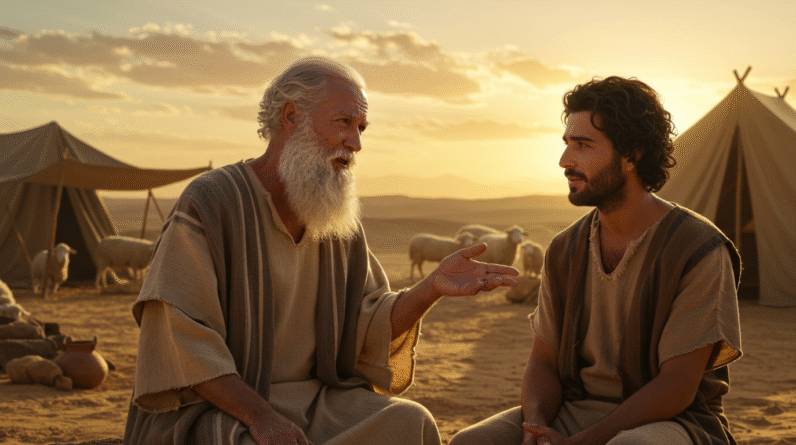Explore Trophimus’s life in biblical narratives, unveiling his subtle yet profound influence on early Christianity. Discover his lessons on faith, loyalty, and cultural connection.

Reflections on the Life of Trophimus in Biblical Narratives
Have you ever encountered someone in life’s journey whose significance is far greater than the few mentions they receive? In biblical narratives, Trophimus appears only a handful of times but leaves a lasting impact that transcends the simplicity of these references. Through these sparse moments, we discover a character deeply embedded in the unfolding story of early Christian history. Trophimus, a disciple of Paul, plays an intriguing role in the New Testament, offering insights into loyalty, companionship, and the hardships that marked the beginnings of the Christian church. By delving into his limited appearances, we gain a deeper appreciation for how seemingly minor figures contribute to a larger divine narrative.
Trophimus in Context
In the intricate tapestry of the New Testament, Trophimus is introduced as a companion of Paul, the Apostle. Though not as extensively profiled as some, Trophimus’s presence is memorable and influential. Originally from Ephesus, he’s identified as an Ephesian, a fact that becomes central to the uproar he unwittingly triggers during Paul’s visit to Jerusalem. His story surfaces distinctly as a testament to the complexities of cultural and religious identities within the early church—a reminder that often, the backdrop of our lives is as significant as the actions we take on center stage.
His Story in the Bible
Acts 21: Trophimus and the Jerusalem Uproar
Trophimus first comes into focus in Acts 21:29. In this passage, Trophimus is noted as the Greek man whom some Jews accused Paul of bringing into the temple, which stirred a riot in Jerusalem. This single incident speaks volumes about the tensions of Jewish and Gentile relations within the framework of the nascent Christian church. The presence of a Gentile like Trophimus in such a contentious spot showcases the significant cultural clashes and the hurdles faced by early Christians as they navigated these new spiritual terrains.
2 Timothy 4: Paul’s Final Farewell
In 2 Timothy 4:20, during what is believed to be Paul’s last written words, Trophimus is mentioned again, but under somber circumstances. Paul records that he left Trophimus sick in Miletus. This brief mention is poignant, highlighting the stark reality and human frailty within their journeys. Despite Trophimus’s earlier brush with danger in Jerusalem, it is an illness that temporarily halts his mission, reflecting the unpredictable challenges faced by Paul’s companions and the intrinsic vulnerability that unites us all across time.
Lessons from Their Life
Trophimus’s life, despite its brevity in the biblical narrative, offers profound lessons of steadfastness, acceptance, and dedication amidst uncertainty. His journey reminds us:
- Cultural Bridgebuilding: Just as Trophimus’s presence sparked controversies, our roles in diverse settings often require understanding and peacebuilding across cultures. We are called to foster connections rather than divisions, much like the Gentile presence in a predominantly Jewish Christian movement.
- Commitment to the Cause: Staying with Paul during tense times underscores Trophimus’s dedication. His narrative encourages us to maintain our commitments amidst trials, anchoring faith during turbulence.
- Human Limitations: The mention of his illness in Miletus is a gentle reminder of human fragility. These moments teach us that setbacks, whether through illness or circumstances, can still serve higher purposes when placed within God’s overarching story.
Connection to Today’s World
In a world riddled with cultural divides and personal struggles, Trophimus’s brief biblical appearances speak directly into contemporary life. His cultural tension amidst early Christianity parallels modern issues of inclusion and diversity. He inspires us to bridge gaps, extend grace, and hold firm to our commitments amidst life’s chaos.
Moreover, as individuals often feel our contributions may be minute within the grand scheme, Trophimus reassures us that every act of faithfulness contributes to the larger narrative. His illness in Miletus reflects the unpredictable nature of life, encouraging patience and gentility both toward others and ourselves in moments of vulnerability.

Key Bible Verse
One of the most defining moments of Trophimus’s journey is captured in Acts:
“(They had previously seen Trophimus the Ephesian in the city with Paul and assumed that Paul had brought him into the temple.)” – Acts 21:29
This verse encapsulates his unforeseen role in catalyzing significant events, reminding us of the unintended impact our presence might have on those around us. It underscores our potential influence, whether recognized or not, in the unfolding of greater divine plans.
Thought-Provoking Question
As you reflect on Trophimus’s journey, consider this: How do you respond when your life’s path leads you into roles of unexpected influence or unforeseen challenges, like Trophimus?
Optional Add-Ons
Historical/Cultural Context
Understanding Trophimus’s significance requires knowledge of the historical cultural tensions within the early church. Greek and Jewish interactions were fraught with religious implications, especially concerning temple rituals. Trophimus’s inadvertent involvement in a temple-related uproar invites further exploration of how cultural blending within religious spaces continues to present challenges and opportunities for unity.
Comparison with Other Characters
Trophimus’s circumstances mirror those of other biblical figures who encountered cultural divides, such as Cornelius—a Roman centurion seen in Acts 10, whose conversion symbolized the extension of God’s grace to Gentiles. Trophimus, like Cornelius, serves as a testament to the inclusivity and adaptive challenges faced in expanding the early church.
Prayer
God, just as you guided Trophimus through challenges unique to his calling, guide us in bridging divides and serving faithfully. Let our limited moments within your greater narrative inspire lasting change and reflect your grace. Amen.







